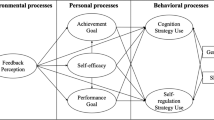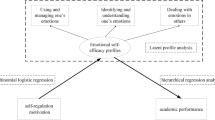Abstract
The relationship between self-referenced feelings and cognitions and self-regulated learning has become an important area of research. But to what extent can differences in self-regulation be explained by differences in motivation and emotion? And how facilitating or debilitating is the effect of motivation and emotion on the use of regulatory study activities? In this study, 292 freshmen were assessed on self-referenced cognitions and feelings. Three months later, regulatory study activities were measured by self-report. The canonical correlation between self-referenced cognitions and feelings and regulatory activities was very substantial (.52), and even invariant of ability differences. Task value and the tendency to achieve success were positively related to self-regulation for both males and females. An impressive gender difference was noticed, however, for the tendency to avoid failure. For female students, a high level of fear of failure acted as a detrimental agent upon regulatory activities. It is concluded that attention should be paid to facilitating and debilitating mechanisms underlying the use of metacognitive activities while being engaged in a cognitive endeavour.
Résumé
L’étude des relations entre, d’une part, les sentiments et les cognitions référés à soi et, d’autre part, l’apprentissage auto-régulé, est devenu un important domaine de recherche. Mais dans quelle mesure les différences d’auto-régulation peuvent elles être expliquées par des différences de motivation et d’émotion? Et comment l’effet de la motivation et de l’émotion peut-il être facilitant ou génant dans la mise en oeuvre d’une régulation des activités d’étude? Dans cette recherche, 292 étudiants nouveaux ont été évalués du point de vue de leurs cognitions et sentiments référés à soi. Trois mois après, la régulations de leurs activités d’étude a été évaluée au moyen de questionnaires. Les corrélations canonoques entre les cognitions et les sentiments référés à soi, et les activités régulées se sont avérées à la fois très substantielles (.52) et indépendantes des différences de compétence. On a trouvé que la valeur des tâches et la tendance à la réussite entretenaient une corrélation positive avec l’auto régulation aussi bien chez les garçons que chez les filles. Une différence importante entre les sexes a été notée, cependant, pour la tendance à éviter l’échec. Pour les filles, un niveau élevé de crainte de l’échecagit comme un facteur préjudiciable à la régulation des activités. Les auteurs concluent qu’il faut accorder de l’attention aux mécanismes facilitateurs et non facilitateurs sous-tendant l’utilisation des activités métacognitives lors de l’engagement un effort cognitif.
Similar content being viewed by others
References
Atkinson, J.W. (1974). The mainsprings of achievement-oriented activity. In J.W. Atkinson & J.O. Raynor (Eds.),Motivation and achievement (pp. 13–41). Washington, DC: Winston.
Bardos, A.N., Naglieri, J.A., & Prewett, P.N. (1992). Gender differences on planning, attention, simultaneous, and successive cognitive processing tasks.Journal of School Psychology, 30, 293–305.
Birenbaum, M., & Pinku, P. (1997). Effects of test anxiety, information organization, and testing situation on performance on two test formats.Contemporary Educational Psychology, 22, 23–38.
Boekaerts, M. (1994). Action control: How relevant is it for classroom learning? In J. Kuhl & J. Beckmann (Eds.),Volition and personality: Action versus state orientation (pp. 427–435). Seattle: Hogrefe & Huber.
Boekaerts, M. (1995). The interface between intelligence and personality as determinants of classroom learning. In D.H. Saklofske & M. Zeidner (Eds.),International handbook of personality and intelligence (pp. 161–183). New York: Plenum Press.
Boekaerts, M. (1996). Coping with stress in childhood and adolescence. In M. Zeidner & N.S. Endler (Eds.),Handbook of coping: Theory, research, application (pp. 452–484). New York: Wiley.
Boekaerts, M. (1997). Self-regulated learning: A new concept embraced by researchers, policy makers, educators, teachers, and students.Learning and Instruction, 7, 161–186.
Boekaerts, M. (1998, August).Self-regulated learning: From theory to practice. Invited address at the 24th International Congress of Applied Psychology, San Francisco, CA.
Brown, W.F. (1964).Effective study test: Manual of directions. Texas: Effective Study Materials.
Corno, L. (1993). The best-laid plans. Modern conceptions of volition and educational research.Educational Researcher, 22, 14–22.
Culler, R.E., & Holahan, C.J. (1980). Test anxiety and academic performance: The effects of study-related behaviors.Journal of Educational Psychology, 72, 16–20.
Eccles, J., Adler, T.F., Futterman, R., Goff, S.B., Kaczala, C.M., Meece, J., & Midgley, C. (1983). Expectancies, values and academic behaviors. In J.T. Spence (Ed.),Achievement and achievement motives (pp. 75–146). San Francisco, CA: Freeman.
Efklides, A. (1998).Metacognitive experiences in problem solving. Keynote address at the International Conference on Motivation, 6th Workshop on Achievement and Task Motivation, Thessaloniki, Greece.
Everson, H.T., Smodlaka, I., & Tobias, S. (1994). Exploring the relationship of test anxiety and metacognition on reading test performance: A cognitive analysis.Anxiety, Stress and Coping: An International Journal, 7, 85–96.
Feather, N.T. (1982). Expectancy-value approaches: present status and future directions. In N.T. Feather (Ed.),Expectations and actions: Expectancy-value models in psychology (pp. 395–420). Hillsdale, NJ: Erlbaum.
Flavell, J.H. (1979). Metacognition and cognitive monitoring: A new area of cognitive-developmental inquiry.American Psychologist, 34, 906–911.
Frydenberg, E., & Lewis, R. (1991). Adolescent coping: The different ways in which boys and girls cope.Journal of Adolescence, 14, 119–133.
Garcia, T., & Pintrich, P.R. (1996). Assessing students’ motivation and learning strategies in the classroom context: The motivated strategies for learning questionnaire? In M. Birenbaum & F.J.R.C. Dochy (Eds.),Alternatives in assessment of achievements, learning processes and prior knowledge (pp. 319–339). Boston, MA: Kluwer Academic.
Gjesme, T. (1973). Achievement-related motives and school performance for girls.Journal of Personality and Social Psychology, 26, 131–136.
Gjesme, T. (1983). Motivation to approach success (TS) and motivation to avoid failure (TF) at school.Scandinavian Journal of Educational Research, 27, 145–164.
Heim, A.W., Watts, K.P., & Simmonds, V. (1982).Manual for the AH6 group tests of high-level intelligence. Windsor, England: NFER-Nelson.
Kanfer, R. (1987). Task-specific motivation: An integrative approach to issues of measurement, mechanisms, processes, and determinants.Journal of Social and Clinical Psychology, 5, 237–264.
Kuhl, J. (1994). Action versus state orientation: Psychometric properties of the Action Control Scale (ACS-90). In J. Kuhl & J. Beckmann (Eds.),Volition and personality: Action versus state orientation (pp. 47–59). Seattle: Hogrefe & Huber.
Meece, J.L. (1994). The role of motivation in self-regulated learning. In D.H. Schunk & B.J. Zimmerman (Eds.),Selfregulation of learning and performance: Issues and educational applications (pp. 25–44). Hillsdale, NJ: Erlbaum.
Mehrabian, A., & Bank, L. (1978). A questionnaire measure of individual differences in achieving tendency.Educational and Psychological Measurement, 38, 475–478.
Minnaert, A. (Ed.) (1992).Experimentele versie AH56-L (Experimental version AH56-L). Leuven, Belgium: Catholic University of Leuven.
Minnaert, A., & Janssen, P.J. (1996). How general are the effects of domain-specific prior knowledge on study expertise as compared to general thinking skills? In M. Birenbaum & F.J.R.C. Dochy (Eds.),Alternatives in assessment of achievements, learning processes and prior knowledge (pp. 265–281). Boston, MA: Kluwer Academic.
Minnaert, A., & Janssen, P.J. (1997). Bias in the assessment of regulation activities in studying at the level of Higher Education.European Journal of Psychological Assessment, 13, 99–108.
Naveh-Benjamin, M., McKeachie, W.J., Lin, Y.-L., & Holinger, D.P. (1981). Test anxiety: Deficits in information processing.Journal of Educational Psychology, 73, 816–824.
Newman, R.S. (1991). Goals and self-regulatory learning: What motivates children to seek academic help. In M.L. Maehr & P.R. Pintrich (Eds.),Advances in motivation and achievement. Goals and self-regulatory processes (vol. 7, pp. 151–183). Greenwich, CT: JAI Press.
Newman, R.S. (1994). Adaptive help seeking: A strategy of self-regulated learning. In D.H. Schunk & B.J. Zimmerman (Eds.),Self-regulation of learning and performance: Issues and educational applications (pp. 283–301). Hillsdale, NJ: Erlbaum.
Pintrich, P.R., & De Groot, E.V. (1990). Motivational and self-regulated learning components of classroom academic performance.Journal of Educational Psychology, 82, 33–40.
Pintrich, P.R., Roeser, R.W., & De Groot, E.A.M. (1994). Classroom and individual differences in early adolescents’ motivation and self-regulated learning.Journal of Early Adolescence, 14, 139–161.
Rand, P., Lens, W., & Decock, B. (1991). Negative motivation is half the story: Achievement motivation combines positive and negative motivation.Scandinavian Journal of Educational Research, 35, 13–30.
Roney, C.J.R., & Sorrentino, R.M. (1995). Reducing self-discrepancies or maintaining self-congruence? Uncertainty orientation, self-regulation, and performance.Journal of Personality and Social Psychology, 68, 485–497.
Sarason, I.G. (1984). Stress, anxiety and cognitive interference: Reaction to tests.Journal of Personality and Social Psychology, 46, 929–938.
Schiefele, U., & Schreyer, I. (1994). Intrinsische Lernmotivation und Lernen. Ein Überblick zu Ergebnissen der Forschung.Zeitschrift für Pädagogische Psychologie, 8, 1–13.
Seiffge-Krenke, I. (1990). Developmental processes in self-concept and coping behaviour. In H. Bosma & S. Jackson (Eds.),Coping and self-concept in adolescence (pp. 51–68). Berlin: Springer.
Senécal, C., Koestner, R., & Vallerand, R.J. (1995). Self-regulation and academic procrastination.The Journal of Social Psychology, 135, 607–619.
Stinissen, J. (Ed.) (1987).De overgang van secundair naar hoger onderwijs: Een follow-up van 6000 abituriënten Rapport 3: Doorstromen en slagen (The transition from secondary to higher education. A follow-up of 6000 school-leavers — Report 3: the transfer to higher education and study success in the first year of higher education). Leuven, Belgium: Acco.
Vizcarro, C., Bermejo, I., Castillo, del M., & Aragonés, C. (1996). Development of an inventory to measure learning strategies. In M. Birenbaum & F.J.R.C. Dochy (Eds.),Alternatives in assessment of achievements, learning processes and prior knowledge (pp. 341–364). Boston, MA: Kluwer Academic.
Vollmeyer, R., Rollett, W., & Rheinberg, F. (1997). How motivation affects learning. In M.G. Shafto & P. Langley (Eds.),Proceedings of the Nineteenth Annual Conference of the Cognitive Science Society (pp. 796–801). Mahwah, NJ: Erlbaum.
Weinert, F.E. (1987). Introduction and overview: Metacognition and motivation as determinants of effective learning and understanding. In F.E. Weinert & R.H. Kluwe (Eds.),Metacognition, motivation, and understanding (pp. 1–16). Hillsdale, NJ: Erlbaum.
Weinstein, C.E., Palmer, D.R., & Schulte, A.C. (1987).LASSI: Learning And Study Strategies Inventory. Clearwater, FL: H & H Publishing.
Wittmaier, B. (1972). Test anxiety and study habits.The Journal of Educational Research, 65, 852–854.
Wood, R.E., & Locke, E.A. (1987). The relation of self-efficacy and grade goals to academic performance.Educational and Psychological Measurement, 47, 1013–1024.
Yamauchi, H., & Tanaka, A. (1998, March).Individualistic and collectivistic need for achievment in Japanese students. Paper presented at the International Conference on Motivation, 6th Workshop on Achievement and Task Motivation, Thessaloniki, Greece.
Zimmerman, B.J., & Martinez-Pons, M. (1990). Student differences in self-regulated learning: Relating grade, sex, and giftedness to self-efficacy and strategy use.Journal of Educational Psychology, 82, 51–59.
Author information
Authors and Affiliations
Corresponding author
Rights and permissions
About this article
Cite this article
Minnaert, A. Motivational and emotional components affecting male’s and female’s self-regulated learning. Eur J Psychol Educ 14, 525–540 (1999). https://doi.org/10.1007/BF03172977
Received:
Revised:
Issue Date:
DOI: https://doi.org/10.1007/BF03172977




